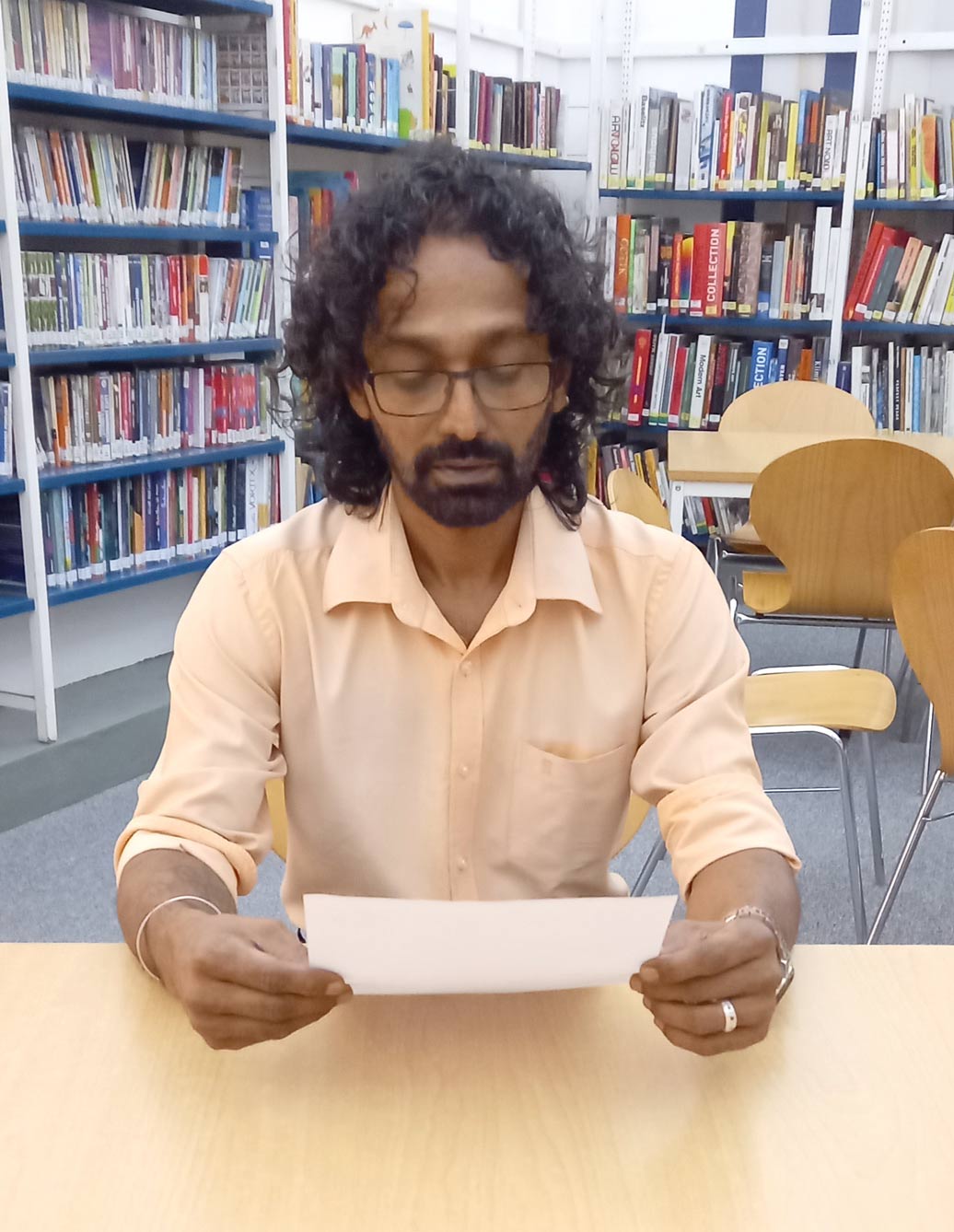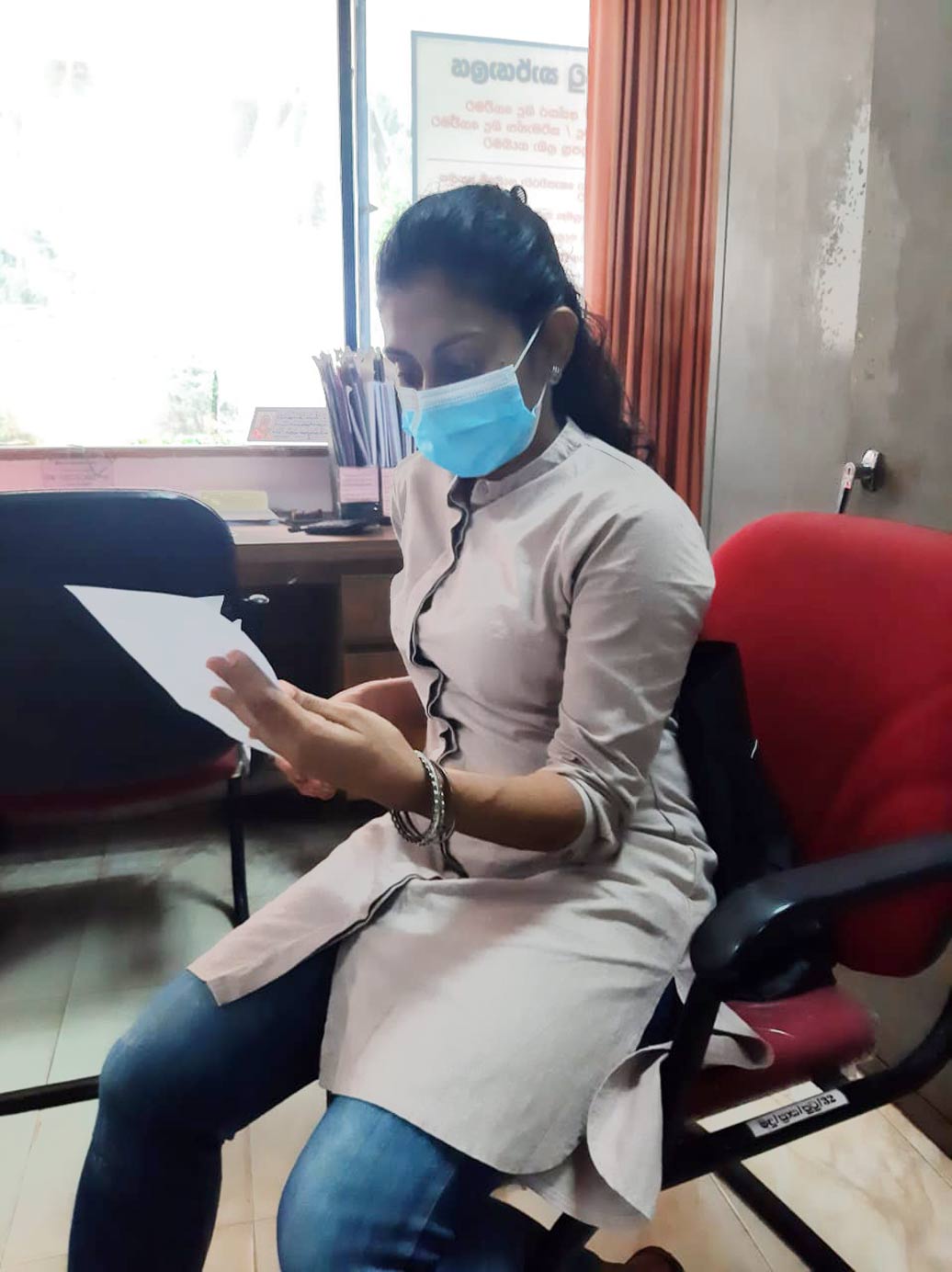Rebroadcasting of the Japanese Language Radio Program in Sri Lanka, 2022

パフォーマーDammika Koddituwakkuのポートレイト, 2021
Portrait of one of the performers, Dammika Koddituwakku, 2021

パフォーマーKanchana Malshaniのポートレイト, 2021
Portrait of one of the performers, Kanchana Malshani, 2021
芸術祭「コロンボスコープ2021:言語は移民」と「A Thousand Channels」によるコミッションワーク
パフォーマー:Kanchana Malshani、Zul Luthufi、Dammika Koddituwakku、Iromi Goonasekera Poloni、M.T. Sajith Vihan Shavinda
特別協力:Yoko Okada、Masa Okada、Maya Weerapura、Yoji Weerapura、 えぃみぃ(Emi Kanazawa)、秋葉原BCLクラブ
Commissioned and produced by Colomboscope: Language is Migrant with A Thousand Channels
Readers: Kanchana Malshani, Zul Luthufi, Dammika Koddituwakku , Iromi Goonasekera Poloni, M.T. Sajith Vihan Shavinda
Special thanks to Yoko Okada, Masa Okada, Maya Weerapura, Yoji Weerapura, Amy (Emi Kanazawa) and Akihabara BCL Club
スリランカ放送局での日本語ラジオ番組を再放送する
2022, 音声
芸術祭「コロンボスコープ2021:言語は移民」と「A Thousand Channels」によるコミッションワーク
丹羽良徳が2017年から継続しているシリーズ作品「自分自身、意味を理解してないことを話してもらう」の一環として、ある特定の言語を話す人を招待し、(日本語の音声をアルファベットに変換するなど)音訳した特定の原稿(しばしば政治的なスピーチなどを含む)を意味を理解できない状態のままで読んでもらう、特定の文脈を題材とした音声作品です。言語の意味と発音、つまり意味づけされたものと意味づけるものの間に意図的に不協和音を作り出すことによって、「ポスト真実時代」における意味づけの仕組みについて考察します。また同時に、展開する政治的出来事や国家による政策と、それらに影響を受けながらも限られた、または全く影響力を及ぼせない人々との明白な距離感をパフォーマティブなパラレル世界で描きます。1970年代から80年代にかけて、スリランカ放送協会はコロンボを拠点とする日本人ラジオ・ジャーナリスト岡田陽子さんによる15分間の日本語ラジオ番組を週に1回放送していた。スリランカで民族間の緊張が高まった内戦初期を含む社会的、政治的に最も激動の時代に、岡田陽子さんは、島に移住したものの現地の言葉を話せない日本人移民のコミュニティに向けて電波を通して彼女の解釈による社会情勢を発信した。日本にも熱心なリスナーが多く、岡田陽子さんに多くの手紙が届いた。現地の政治情勢を中心に、天気や食事などのさりげない話題を交えたこの日本語番組は、1989年に岡田陽子さんが渡米することにより終了し、高齢となった彼女はスリランカに戻ります。この作品は、異国の地で目の前の現実を理解しようとしながらも、自分たちの言語に対する喪失感や欲望といった具体的な体験に関連づけ、スリランカの日本人コミュニティの歴史と記憶をたどっていくものです。日本語のラジオ番組の原稿を要約したものは、芸術祭のためのラジオ番組シマ・タリクによる「千のチャンネル」の一部として公開されます。さまざまな世代のスリランカ人が読み上げる言葉の意味を理解できないまま、自分たちの歴史と密接に関係する出来事を語り出します。(文:キュレーター Anushka Rajendran)
- コロンボスコープ2021による委託制作
- キュレーション:アヌシュカ・ラジェンドラン
- 芸術祭「コロンボスコープ2021:言語は移民」
- スリランカ
- 2022年1月20-30日
- パフォーマー:Kanchana Malshani、Zul Luthufi、Dammika Koddituwakku、Iromi Goonasekera Poloni、M.T. Sajith Vihan Shavinda
- 特別協力:Yoko Okada、Masa Okada、Maya Weerapura、Yoji Weerapura、 えぃみぃ(Emi Kanazawa)、秋葉原BCLクラブ
Rebroadcasting of the Japanese Language Radio Program in Sri Lanka
2022, Sound
Commissioned and produced by Colomboscope: Language is Migrant with A Thousand Channels
is a context specific, sonic iteration of Yoshinori Niwa’s ongoing series Forcing People to Speak About What They Don’t Understand, as part of which he invites speakers of one language to read a phonetically transliterated script—often singular perspectives on transformative political events—in a language they do not understand. By intentionally creating dissonances between the meaning and the sound of a language—the signified and the signifier—the artist reflects on the machinations of meaning-making in the post-truth era, while also drawing a performative parallel with the palpable distance of political events as they unfold and state policies, from those who are affected by them, yet have limited or no agency over such occurrences. During the 1970s and 80s, the Sri Lanka Broadcasting Corporation broadcasted Japanese language radio programming for 15 minutes, once a week by Colombo based Japanese radio journalist Yoko Okada. During some of the most socially and politically turbulent years in the island—which also included the early phase of the civil war—when ethnic tensions became pronounced, Yoko Okada transmitted her interpretation of the context via radio waves for a community of Japanese migrants who were settled in the island but did not speak any of the local languages. There were also many enthusiastic listeners in Japan who sent many letters to Yoko Okada as well. The news program which primarily focused on the local political situation, interspersed with casual observations on the weather and gastronomy, came to an end in 1989 when Yoko Okada moved to the United States for a period of time before returning to Sri Lanka in her old age. The project traces the history and memory of the Japanese community in Sri Lanka by relating to their specific experience of loss and longing for their language while attempting to make sense of their immediate reality in an alien context. Excerpts from transcripts of the radio program in Japanese are activated as part of the radio program for Language is Migrant, A Thousand Channels by Syma Tariq. A multigenerational group of Sri Lankans narrate events that are closely connected to their history even as they cannot comprehend the meaning of the words that they read out loud. (text by curator Anushka Rajendran)
- Commissioned and produced by Colomboscope
- Curated by Anushka Rajendran
- Festival Colomboscope: Language is Migrant
- Sri Lanka
- 20–30 January 2022
- Readers: Kanchana Malshani, Zul Luthufi, Dammika Koddituwakku , Iromi Goonasekera Poloni, M.T. Sajith Vihan Shavinda
- Special thanks to Yoko Okada, Masa Okada, Maya Weerapura, Yoji Weerapura, Amy (Emi Kanazawa) and Akihabara BCL Club